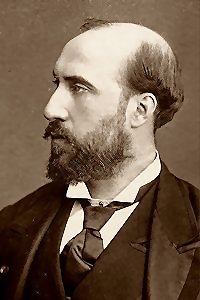Introduction
Born: January 15, 1830, Moulins, Allier, France.
Died: November 9, 1914, Paris, France.
Buried: Père Lachaise Cemetery, Paris, France.

Born: January 15, 1830, Moulins, Allier, France.
Died: November 9, 1914, Paris, France.
Buried: Père Lachaise Cemetery, Paris, France.

Faure was the husband of Constance Caroline Lefevre.
He was a operatic baritone, art collector, and composer of a number of classical songs.
A choir boy in his youth, he entered the Paris Conservatory in 1851. He made his operatic debut the following year at the Opéra-Comique, as Pygmalion in Victor Massé’s Galathée.
He stayed at the Opéra-Comique over seven years, creating the Marquis d’Erigny in Auber’s Manon Lescaut (1856) and Hoël in Meyerbeer’s Le Pardon de Ploërmel (1859, later known as Dinorah), among seven premieres at that house.
He debuted at the Royal Opera House, Covent Garden, London, in 1860 as Hoël, and at the Paris Opera in 1861. He would sing at the Opera every season until 1869 and then again in 1872–76 and 1878. In addition, he performed off and on in London until 1877 at venues such as Her Majesty’s Theatre and the Theatre Royal, Drury Lane.
Among the many operas in which he appeared in Paris were Mozart’s Don Giovanni as well as L’Étoile du Nord, Les Huguenots and La Favorite.
He also made history by creating several important operatic roles written by prominent composers such as Giacomo Meyerbeer, Giuseppe Verdi and Ambroise Thomas. They included the leading baritone parts in L’Africaine, Don Carlos and Hamlet (in 1865, 1867 and 1868, respectively).
Faure’s last stage appearances are recorded as taking place in Marseilles and Vichy in 1886.
In addition to singing, Faure composed several enduring songs, including Sancta Maria, Les Rameaux (The Palms), and Crucifix. The latter two were recorded by Enrico Caruso, among others.